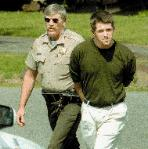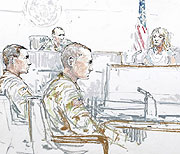
WASHINGTON POST; By Blaine Harden; June 4th, 2006;
Helena, Montana — Like a hunter using a duck call, Shannen Rossmiller invites the online attentions of would-be terrorists by adorning her e-mail with video clips of Westerners getting their heads cut off.
“They get pumped up when they see beheadings. For them, it’s like rock videos,” Rossmiller said. “I always give the appearance that I am one of them.”
Appearances deceive. As a child savant, she knew three languages. At her Montana high school, Rossmiller was a cheerleader — a farm girl whose slight frame meant she was the one hoisted to the top of the human pyramid. Now 37, she is a mother of three, a part-time paralegal and a municipal court judge for the last nine years.
Judicial associations confirmed she was the youngest female jurist in U.S. history in 1998, at 28 years old.
Since the Sept. 11, 2001, attacks, she has found herself an unpaid night job. She uses the Internet to find terrorism suspects, hunting for them between 3 a.m. and dawn on her home computer while her family sleeps. Her husband, Randy, a wireless network technician, keeps eight computers and two broadband systems working in their house.
Posing as an al-Qaeda operative, she has helped FBI special agents set up stings that have netted two Americans — a Washington State National Guardsman convicted in 2004 of attempted espionage, and a Pennsylvania man who prosecutors say sought to blow up oil installations in the United States. Rossmiller was a key prosecution witness against the Guardsman, who is serving a life sentence, and she expects to be called as a witness in the Pennsylvania case.
Most of Rossmiller’s terrorist tracking, though, has focused on foreign suspects. By her count, she has turned over to federal investigators about 60 “packages” of information on suspects outside the United States. She provided The Washington Post with hundreds of pages of e-mail exchanges that she said are transcripts of her conversations with these would-be jihadists.
Rossmiller says she meets nearly every week with U.S. intelligence contacts in Montana, and they have periodically given her feedback about the usefulness of her information. She claims that foreign officers have detained more than a dozen individuals whom she helped identify.
Federal sources confirmed that for several years, she has provided the FBI and the CIA with valuable intelligence. But the assertions about detentions of foreign suspects could
not be independently verified, and officials from the FBI and CIA declined to speak publicly about her.
Still, it raises the remarkable prospect that the government regularly uses a self-trained
Internet sleuth to help fight terrorism at home and abroad. Given several chances to do so, no one in the intelligence community characterized Rossmiller as a crank.
The former Director of Central Intelligence under President Carter, R. James Woolsey, is familiar with Rossmiller’s work and he spoke glowingly about her talents. “She is brave, resourceful, patriotic, disarming, smart and crafty.”
Protecting the judge and her family in their rural Montana home, not far from the Canadian border, has for two years been a regular agenda item at meetings between local police, the FBI and U.S. Border Patrol agents, according to a Montana law enforcement official who requested anonymity.
Rossmiller’s night job became public knowledge in 2004, when she testified against Spec. Ryan G. Anderson, who was part of a National Guard tank crew based at Fort Lewis, Wash.
She spotted him Oct. 6, 2003, when he appeared, writing in English, on an Arabic Internet forum. The judge apparently convinced him she was a member of alQaeda and he wrote back, asking: “Just, curious, would there be any chance a brother who might be on the wrong side at the present could join up — defect, so to speak?”
Anderson was arrested six days before his unit was deployed to Iraq. Rossmiller was a key witness at his court-martial, during which one of her e-mail identities was published in newspapers.
Hours later, a man with a Middle Eastern accent called the Montana courthouse where she works and asked for her address. She and her husband have since obtained permits to carry concealed weapons. She sometimes carries a .38-caliber pistol in her purse.



In February, she was again identified in court documents after she posed online as an al-Qaeda operative and offered money to Michael Curtis Reynolds, who a U.S. attorney in Pennsylvania has said is suspected of plotting to blow up oil and gas pipelines.
Rossmiller said she snared the two American terrorism suspects while casting Internet hooks for bigger fish: Arabic-speaking extremists in the Middle East and in Pakistan. To find them, she has invented a cast of male online characters. They hold court — spitting insults at “dirty Americans” and distributing videos of beheadings — on several Islamic Web sites, according to transcripts of her e-mail exchanges.
Using those personas, Rossmiller strikes up conversations with chatty extremists. She communicates primarily in Arabic, which she began learning after the Sept. 11, 2001, attacks — her fourth language. She also uses a computer translation program and said the FBI has occasionally provided her with a native Arabic speaker.
As part of her online approach, she offers arms and money to fight in Iraq and to kill slaves of the cross.” She said her work led to the detention last year of several men training to enter Iraq to fight U.S. troops, as well as to the arrest of a Middle Eastern academic seeking al-Qaeda funding for his plans to build a nuclear bomb. Federal agencies declined to comment on both cases.
Rossmiller said that “2005 was a very productive year for me.”
Why is Rossmiller talking about terrorist hunting that has not been made public in court?
“With the Reynolds case coming up, it is important that people understand what I do,” she said during two long conversations in a Perkins pancake house here. “I don’t work for the FBI, the CIA, Mossad or any of those folks. It wouldn’t make me feel right to be on a payroll.”
After four years of watching the Bush administration’s efforts against terrorism, Rossmiller said her commitment to finding enemies of the United States is stronger than ever, and that she continues to track suspects in the middle of the night. “She doesn’t have normal sleep patterns, never has,” her husband said.
Rossmiller’s online experience, though, has soured her on many of the methods of the government’s fight against terrorism. She said the invasion of Iraq and the use of harsh interrogation techniques has increased the number of people in the Arab world who hate the United States.
“It has created more discord, and the numbers of brothers interested in violence have grown,” she said.
Rossmiller has a knack for the minutiae and theatrics of wooing extremists over the Internet, according to Brent Astley, a Canadian software developer and executive director of a group of online volunteers who try to identify terrorism suspects and turn them over to authorities.
“She was one of the first, and she is definitely one of the best,” said Astley, who in 2002 helped set up Rossmiller with software that hides her computer address in Montana and allows her to appear online as if she lives in Pakistan or elsewhere. Astley said her particular gift is for “cyber-theatrics.”
“She has chutzpah, and that is definitely required,” he said.
One of Rossmiller’s strategies is to warn jihadists that they are risking the lives of their Islamic brothers by speaking too candidly online.
She calls her Arabic skills “workable.” In 2002, she took an eight-week, online Arabic course. Later that year, she went to Buffalo for a two-week course that focused on grammar. But when it comes to online deception, perfect Arabic does not matter much, Astley said. “A lot of the people that are being dealt with are not the cream of educated society,” he said.
As for the foreign terrorism suspects she has identified, Rossmiller said she does not know what has happened to them, other than that some have been detained. “I don’t know what they do with these guys,” she said. “And I don’t want to know.”







